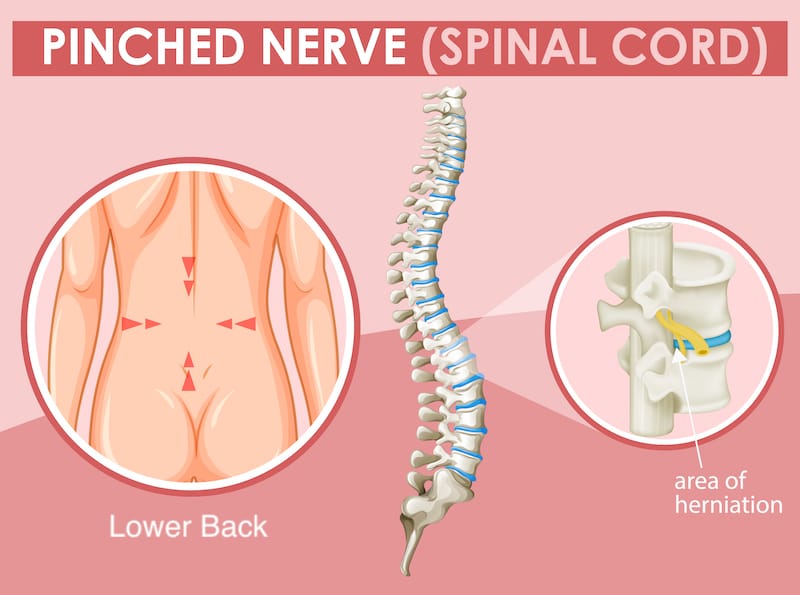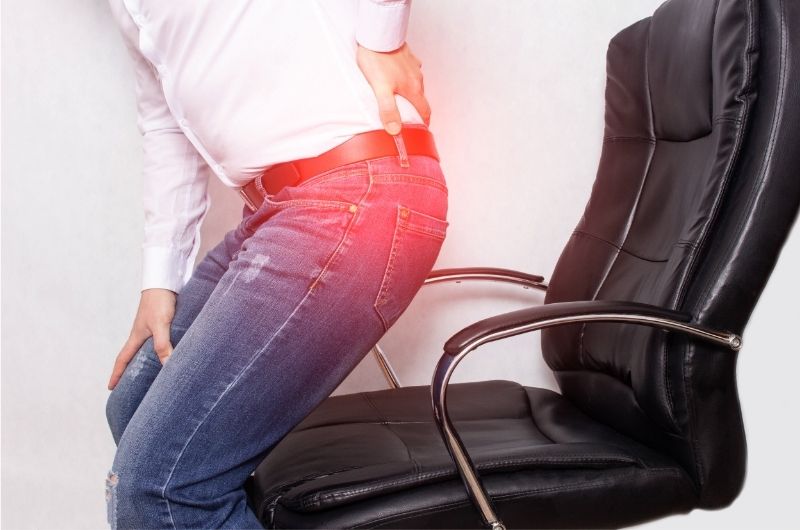Random spots of warm sensations on your body could indicate an underlying health condition. They may appear suddenly without warning and can occur in various body parts, such as the face, neck, chest, and extremities. Many factors may contribute to this symptom, including anxiety, nerve-related issues, infections, allergies, etc. Understanding the underlying causes of warm spots on the body can help identify appropriate treatments and manage any associated symptoms.
Anybody would feel puzzled when they suddenly feel unusual symptoms in their body without knowing the causes.
Random warm spots on your body would make your mind run on possibilities like, “What if it’s an early sign of chronic disease?”
That could be or is not the case.
You must pay attention to other associated symptoms that would help you run down a list of what could be the issue causing this unusual symptom.
Causes of random warm spots on your body
1. Anxiety
Your body may feel weird sensations when you suffer from anxiety or have a history of emotional disorders like anxiety.

Your mind and body have a unique, complex connection, and it’s safe to say that anxiety isn’t just something in your head.
It could stir up every part of your body.
Think about the last time you felt anxious and had a panic attack. You felt it physically, didn’t you?
Anxiety can activate your body’s “fight-or-flight” response, causing increased heart rate, rapid breathing, and increased muscle blood flow.
As a result, your skin will start to feel warm or flushed.
Anxiety can also give you sleep and skin issues, stomach pain, muscle tension and pain, nausea and vomiting, difficulty eating, and other physical symptoms.
Moreover, anxiety can make you more sensitive to your bodily sensations. It causes you to become more aware of any feelings of warmth or discomfort.
For this reason, having random warm or cold spots on your body could be due to anxiety.
Treating anxiety involves psychotherapy and medication. At-home treatments and lifestyle changes can often help you cope with anxiety symptoms.
Talk with your doctor about what treatment plan is best for you. It may include some of the following:
- Therapy. Your doctor may refer you to a professional therapist for counseling. Other methods include biofeedback or neurofeedback therapy and hypnotherapy.
- Medications. Anxiety medications won’twon’t cure the disorder but may help you manage and overcome your symptoms.
- Lifestyle changes and home remedies.
Generally, lifestyle changes may include the following:
- Get enough sleep every day
- Do breathing exercises, meditate, and yoga
- Exercise daily
- Eat a healthy, balanced diet
- Avoid alcohol and caffeine
- Quit cigarettes
4. Alternative natural remedies. These include acupuncture and herbal preparations like valerian root extract, chamomile, ashwagandha, kava, etc.
2. Nerve damage
When damaged, nerves can send abnormal signals to the brain, resulting in burning, tingling, and warm sensations.
This abnormal signaling can also change how the brain perceives temperature in the affected area.
Nerve damage can also affect the body’s ability to regulate its temperature, leading to temperature fluctuations in some areas of your body, resulting in unusual warm sensations.
Below are the following common nerve-related issues that may cause warm spots on your body:
Peripheral neuropathy
It refers to damage to the peripheral nerves, which transmit signals from the spinal cord and brain to other body parts. It can lead to various symptoms, such as numbness, pain, weakness, and tingling in the arms, legs, feet, and hands.
Abnormal sensations, such as random warm spots, may be present in some cases of peripheral neuropathy.
Treatments may include medication, topical treatments, physical therapy, transcutaneous electrical nerve stimulation (TENS), and lifestyle changes.
Pinched nerve (radiculopathy)
It’s a condition when a nerve or group of nerves is “pinched,” compressed, or receives too much pressure from surrounding tissues such as bones, cartilage, muscles, or tendons.
As a result, it causes damage and can happen anywhere in your body but most likely in your neck, shoulders, wrists, elbows, and lower back.

There’s still no known exact cause of the pinched nerve.
You’re at risk if you have rheumatoid arthritis, are pregnant, and suffer from an injury, herniated disc, or bone spurs. It could also be hereditary.
Repetitive movements or overusing a specific part of your body for the same daily activities may result in a pinched nerve.
A pinched nerve may cause pain that could feel like electric, burning, and a hot/cold sensation on the affected area.
The following are also common symptoms of pinched nerve:
- Tingling and stinging pain like “pins and needles”
- Numbness or stiffness
- Muscle weakness like loss of strength and grip
- Hand or foot going numb frequently like it has “fallen asleep”
Home remedies for managing pinched nerves include the following:
- Get extra sleep and rest to encourage nerve healing.
- Adjust or change your posture to reduce discomfort.
- Invest in an ergonomic workstation.
- Take pain-relieving medications. These include over-the-counter drugs like ibuprofen, a nonsteroidal anti-inflammatory drug that should help reduce pain and swelling due to pinched nerves.
- Do stretching and massage or physical therapy.
Other ways to help with pinched nerves include losing extra weight, applying ice and heat packs regularly, elevating your legs (if your lower back is affected), and wearing a splint.
Your doctor may suggest prescription medicine and surgery in severe cases of a pinched nerve.
3. Infections and inflammations
Your body’s immune response due to the presence of a foreign substance may cause warm spots on your body.
When an infection occurs, your immune system sends blood cells to the affected area to fight off the disease, which results in inflammation.
Inflammation is a protective mechanism that helps the body to repair itself.
Symptoms of inflammation include redness, swelling, warmth, and pain in the affected area.
The following are infection and inflammatory diseases that may cause random warm spots on your body:
- Bacterial infections like cellulitis or abscesses.
- Viral infections like shingles are caused by the same virus that causes chickenpox.
- Fungal infections such as ringworm or athlete’sathlete’s foot.
- Inflammatory conditions like rheumatoid arthritis or lupus.
- Allergic reactions to foods, medications, or environmental factors.
4. Hormonal fluctuations
Hormonal changes can cause random warm spots on the body.
For example, during menopause, the decrease in estrogen levels can cause hot flashes and sudden warm sensations on the skin.
Hot flashes can occur throughout the body but are most commonly felt in the face, neck, and chest. This symptom may also occur during pregnancy.
Some women may also experience sudden warmth and flushing sensations due to hormonal fluctuations throughout their menstrual cycle.
Moreover, hormonal imbalances may cause sweating and cause warm sensations in your body and contribute to thyroid problems.
5. Allergies
During an allergic reaction, your body releases histamines and other chemicals, which can cause the blood vessels in your skin to dilate, resulting in warmth, redness, and itching.
It’s commonly seen in allergic reactions such as hives which are characterized by raised, itchy, and often warm patches on the skin.
In some cases, allergies may also cause people to experience a flushed or warm feeling during an allergic reaction.
6. Arthritis

The two most common types of arthritis include rheumatoid arthritis and osteoarthritis.
Both types can give you a symptom that would feel like unusual warmth when you touch a section of your skin. It could be a sign of inflammation or joint swelling.
Other than inflammation, rheumatoid arthritis can also give you the following symptoms:
- Joint pain and aches
- Joint tenderness and swelling lasting more than six weeks
- Morning stiffness that lasts for hours
- Same joints symptoms on both sides of the body
- Weakness and fatigue
- Loss of joint function and deformities
- Low-grade fever
- Loss of appetite
Meanwhile, osteoarthritis can give you the following symptoms:
- Joint pain and aches
- Joint stiffness in the morning lasting for hours
- Soreness or tenderness on the affected area when touched
- Reduced range of motion and loss of flexibility
- Feeling like things are rubbing together inside your joint, creating crepitus, popping, or grating sounds
- Bone spurs or lumps of bone around the joint
Treatments for arthritis or warm joints may include nonsteroidal anti-inflammatory drugs (NSAIDs), topical pain relievers, steroids, and disease-modifying antirheumatic drugs (DMARDs).
Physical therapy can help strengthen the muscles and joints and improve flexibility, while exercise, rest, and enough sleep can improve mobility and encourage healing.
A balanced healthy diet is also essential, as processed foods high in saturated fat, sugar, and salt can cause inflammation and worsen symptoms.
Why is the skin under my thighs or legs burning?
There are many possible reasons for this. It could be an injury or effect of intense exercise, nerve irritation, or joint and muscle problems.
Often, these warm sensations are accompanied by other symptoms like pain or swelling and inflammation.
Below are some possible health conditions causing warm or burning sensations under the skin of your thighs or legs:
1. Meralgia paresthestica
]It’s a form of nerve damage that happens when the lateral femoral cutaneous nerve that provides sensation to the skin on your thigh is irritated, compressed, or pinched.
It’s usually not severe and could resolve on its own after a few months.
Minor meralgia paresthestica can be treated with conservative treatments like wearing loose clothing, getting enough rest, losing extra weight when overweight, and physical therapy or deep tissue massage.
Medications like nonsteroidal anti-inflammatory drugs (NSAIDs) and pain relievers could also help.
In severe cases, prescription medicines and surgery could be your best options.
2. Lumbar radiculopathy
Warm sensations in your thigh could be an early sign of lumbar radiculopathy.
You might develop this condition when the spinal nerve roots in your lower back area are compressed due to an injury or other diseases like a herniated lumbar disc, bone spurs, tumors, etc.
The following symptoms usually accompany this disease:
- Sharp pain in your lower back radiating to your outer thighs down to your foot
- Numbness in your inner or outer thighs
- General weakness in your thighs and legs
- A sensation of reflex changes or hypersensitivity
Treatments for lumbar radiculopathy depend on the severity of your condition.
You may need to take NSAIDs, pain medications, oral or injectable steroids, cold and heat therapy, and physical therapy.
When first-line treatments fail to alleviate your pain and symptoms, you may discuss with your doctor about getting surgery.
It could be sciatica

Sciatica is a set of symptoms caused by lumbar or sacral radiculopathy.
It’s a form of pain that radiates from the lower back into the thigh, leg, and/or foot. It could also give you a sensation like warm or hot water running down your leg.
3. Venous Reflux
This condition is also known as chronic venous insufficiency (CVI).
It occurs when the valves of the veins in the top of your foot to your upper thigh or groin area (saphenous veins) are damaged or impaired.
This condition causes your blood to “reflux,” leak, or move backward instead of returning to your heart and could collect or pool in your leg, foot, or toes.
This condition may give you symptoms such as a hot or burning sensation often accompanied by discoloration and itching when that happens.
Non-invasive treatments are available, but your doctor might recommend surgery to repair the damaged valves or blocked veins.
Takeaway
Getting random warm spots on your body could tell many things.
It might’ve occurred spontaneously without underlying causes or could be an early symptom of anxiety and joint and nerve problems.
Other things to consider are hormonal changes, injury, infections, skin irritations, reaction to medications, or an early sign of a chronic illness.
It could just be a sunburn too!
You better schedule a check-up with your doctor immediately and get a proper diagnosis to get adequate treatment for the random warm spots on your body.
References
- https://www.healthline.com/health/biofeedback
- https://www.medicalnewstoday.com/articles/hypnosis-for-anxiety
- https://www.healthline.com/health/anxiety-drugs
- https://www.healthline.com/health/breathing-exercises-for-anxiety
- https://www.healthline.com/health/peripheral-neuropathy
- https://www.mayoclinic.org/healthy-lifestyle/adult-health/in-depth/office-ergonomics/art-20046169
- https://www.healthline.com/health/cellulitis
- https://myhealth.alberta.ca/Health/Pages/conditions.aspx?hwid=pl1013
- https://www.medicalnewstoday.com/articles/meralgia-paresthetica-exercises
- https://www.uofmhealth.org/conditions-treatments/back-neck-spine/sciatica-lumbar-or-sacral-radiculopathy
- https://www.healthline.com/health/venous-insufficiency


